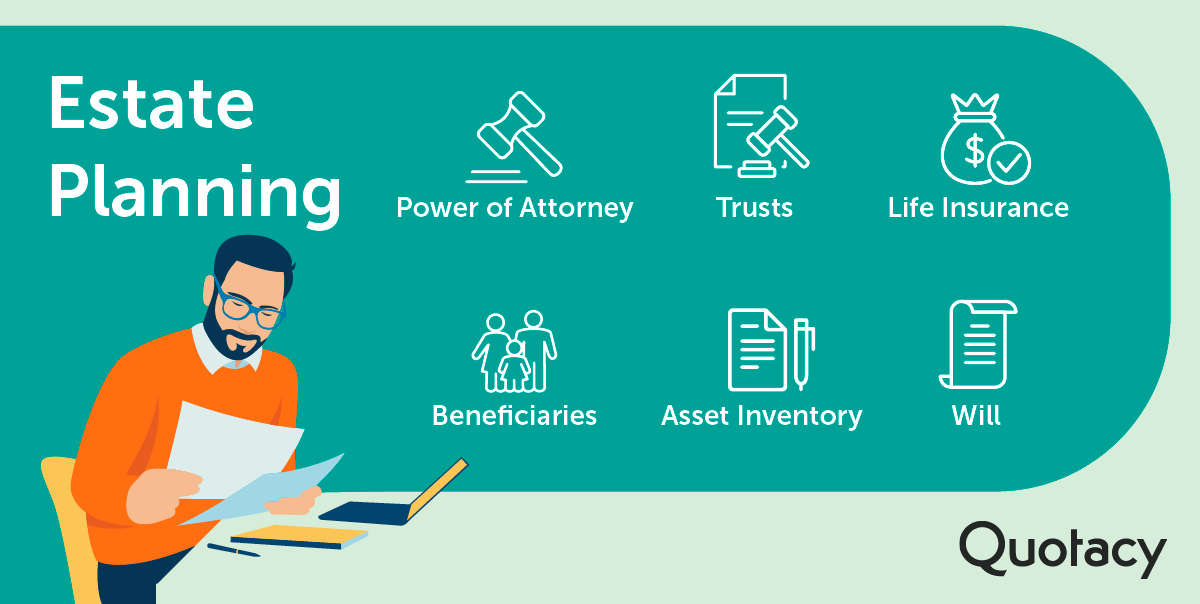Everyone can benefit from a well-crafted estate plan regardless of income or wealth. An estate simply refers to what you own. And estate planning refers to planning what happens when you die: who will manage the estate, who gets what assets, and even what happens if you become incapacitated.
Our comprehensive estate planning checklist is here to guide you through the essential steps of creating a personalized plan that caters to your unique needs. Follow this checklist to get on the right track to controlling your assets and legacy and taking care of those you love.

What Is an Estate Plan?
An estate plan is a financial strategy that outlines how you want to pass on your wealth and possessions to your loved ones or next of kin. Proper estate planning ensures that your wishes are carried out in accordance with your preferences and values.
A well-designed estate plan can help you:
- Minimize or eliminate estate taxes
- Provide for orderly family business succession
- Plan for incapacity
- Avoid probate, which can be costly, time-consuming, and public
- Promote a charitable cause
- Minimize family conflict
- Arrange for the guardianship of your minor children
- Preserve wealth throughout generations
- Protect assets from creditors, divorces, and lawsuits
- Provide for loved ones with special needs while preserving eligibility for government sponsored programs
An Estate Planning Checklist
This checklist for estate planning will make it easier for you to keep track of the important documents and decisions you need to make to plan for the future. It will help you understand what you must do and ensure you don’t miss any essentials.
Take Inventory of All Your Assets
To pass down valuable and sentimental property, you first need to list what you have so you can decide what to distribute and to whom.
- Do a Physical Items Inventory: Go around the inside and outside of your home and list everything of value (typically worth $500 or more.) Examples of items to list include your house, cars, electronics, power tools, jewelry, and antiques.
- Do a Non-Physical Items Inventory: Next, make another list of non-physical assets such as 401(k) plans, bank accounts, life insurance policies, and so forth.
Take Note of Your Debt
How much debt do you currently have? Do you know what happens to your debt if you die?
- If you have co-owned or co-signed debt, the co-owner and co-signer will become responsible.
- Other debt will be paid through your estate assets. Creditors are paid before heirs.
List your outstanding liabilities, such as student loans, mortgages, credit card debt, lines of credit, etc. Doing so will make it easier for your estate executor to manage upon your death.
If you have a considerable amount of debt that would become a burden to someone else, consider getting life insurance to protect this person’s financial future.
Make Sure You Have Adequate Life Insurance
Life insurance has many uses. Regarding estate planning, you can use it to fund a trust that achieves specific goals, like providing for a child’s education or supporting a charitable cause.
Additionally, life insurance can provide the liquidity needed to pay estate taxes, which can significantly impact what is ultimately passed on to your beneficiaries.
The benefits of life insurance as part of an estate plan:
- The death proceeds are available immediately when needed.
- The death proceeds are usually received free of federal income tax.
- The policy can be arranged to avoid probate costs.
- Liquidation of estate assets, perhaps at sacrifice prices, can be avoided.
- Borrowing the cash at interest is also avoided, including paying the federal estate tax in installments.
- The policy will return more in death proceeds than was paid in premiums, allowing estate costs to be funded at a discount.
- For individuals whose estates will be subject to federal estate tax, life insurance can be arranged to avoid inclusion in the gross estate.
Life insurance is most important for income replacement. If you have loved ones who rely on your paycheck, getting a term life insurance policy can be a lifesaver if you die unexpectedly. Find out how much life insurance you need with our life insurance calculator.
See what you’d pay for life insurance
Establish a Will
A will is essential to any estate plan.
The purpose of a will is to dictate what you want to happen with your assets after you die. It not only makes the management of your estate easier but can also prevent family arguments over possessions.
Your will is also where you can indicate who you wish to become the legal guardian of your minor children.
It’s important to note that in blended family situations, a simple will won’t cut it. A simple will typically leaves everything to your spouse. Upon their death, everything is divided equally among all children, including those from previous relationships, stepchildren, and children from the current marriage.
However, there is nothing to prevent your spouse from changing the distribution of assets after your death, which may result in your children from previous relationships being disinherited.
Blended families often need a comprehensive estate plan, like irrevocable life insurance trust to ensure your assets are distributed according to your wishes and your loved ones are taken care of.
Write a Living Will (Advanced Healthcare Directive)
A living will is a legal document that states your wishes for end-of-life medical care if you are incapacitated and unable to speak for yourself. For example, if you got into a horrible car accident and became comatose, your living will would include whether you’d want to be on artificial life support and for how long.
What a living will can do:
- Provide clear instructions for healthcare providers
- Allow you to appoint a healthcare proxy who can make decisions on your behalf
- Ensure that your wishes for medical treatment are respected
- Ensure you receive medical care that is consistent with your values and beliefs
- Relieve family members of the burden of making difficult decisions about your end-of-life care
- Give you peace of mind and a sense of control over serious situations
Consider a Living Trust
A living trust is a legal document that allows you to transfer ownership of assets to the trust while you’re alive.
What a living trust can do:
- Help you keep assets out of probate, which minimizes estate costs
- Provide for dependents and lay out any stipulations for how the assets should be used or distributed
- Manage your assets if you become incapacitated because your trustee can step in
- Reduce estate and inheritance taxes
Trusts and tax laws can be complex. Work with an estate planning attorney to ensure the trust is properly drafted and executed.
Establish a Financial Power of Attorney (POA)
A power of attorney (POA) is a document that states a person or organization you name to act on your behalf concerning financial and business transactions.
What a power of attorney can do:
- Make financial decisions, e.g., pay bills, manage banking transactions, make investment decisions on your behalf
- Manage legal affairs, e.g., sign legal documents, manage court proceedings, negotiate settlements on your behalf
- Manage property, including buying, selling, or rental property management
General power of attorney ends if you become incapacitated or die. A durable POA allows someone to make financial decisions on your behalf, even if you become mentally or physically incompetent.
Learn the differences between important end-of-life documents, including the difference between a durable power of attorney and durable healthcare power of attorney.
Designate Beneficiaries
For many individuals, planning ahead for their beneficiaries is the most crucial part of an estate plan.
Through an estate plan, you can leave assets to your beneficiaries outright by naming them in a will or as direct beneficiaries of retirement accounts, life insurance policies, bank accounts, or investment accounts. Or you can leave assets to them through trusts.
Reviewing and updating your beneficiary designations regularly ensures they reflect your current wishes. In addition, be sure to take care if you have any loved ones that receive government benefits. Naming them outright beneficiaries can disqualify them from needs-based programs. Learn the dos and don’ts of protecting those with special needs or disabilities.
Leave Directions for Your Executors
An executor is responsible for managing your estate’s assets, paying debts and taxes, and distributing the remaining property to the beneficiaries. The executor is a fiduciary with a legal obligation to act in the best interests of your estate and beneficiaries.
You can name an executor in your will, or probate court will assign one.
Choosing an executor ahead of time will speed up the probate process and give you more control over estate management. Choose someone capable of an executor’s responsibilities, as it can be complex. Consider naming an alternate executor in case your first choice is unable or unwilling to serve.
It’s wise to talk with your chosen executors and discuss your wishes. It can be helpful for them to learn their responsibilities ahead of time.
Something else to consider leaving for your executor is a list of your account passwords, including digital assets, such as social media accounts.
To make things easier for your loved ones, talk to them about your end-of-life wishes. Or write a letter of instruction and tell them where important items are located.
A letter of instruction often includes:
- Funeral, burial, and cremation wishes
- Where to locate your will, trust documents, and life insurance policies
- Contact information of attorney, accountant, POA agents, and other advisors
Next Steps for Your Estate Plan
Not everyone needs every estate planning document listed in this article.
Basic Estate Plan Checklist:
- Determine your goals
- Take inventory of assets
- Identify potential beneficiaries
- Choose an executor
- Create a will
- Consider a trust
- Review designated beneficiaries of financial accounts and plans
- Plan for incapacity
Don’t forget to involve your family and loved ones. Keep necessary individuals informed throughout the estate planning process, and ensure they know where to find essential documents and information.
If there are potential conflicts or issues within your family, consider how these may affect your estate plan and work with your attorney to find solutions. An experienced estate planning attorney ensures your estate plan meets your needs and that your family members are appropriately involved.
You don’t need to be rich to need an estate plan. However, occasionally in the news, we’ll hear about estate chaos after a celebrity dies without plans in place.
We don’t hear in the news how ordinary people like you and me die daily without any plans. It can create both financial and emotional turmoil for loved ones.
To avoid potentially messy outcomes, take the time to complete this checklist. You’ll protect your property, assets, and loved ones.
Learn more about the important role life insurance plays in an estate plan.
Make Life Insurance a Part of Your Estate Plan and Get a Quote Today
Life insurance is an integral part of your estate plan. It provides financial security for loved ones after your death, can equalize an inheritance, help reduce taxes, and provide the liquidity needed for end-of-life expenses.
A term life insurance policy is the most affordable type of life insurance. However, its primary purpose is to replace your income for your loved ones if your death is premature.
If you need life insurance for specific estate purposes, such as estate tax liquidity or leaving an inheritance, then permanent life insurance is your best option. Permanent life insurance is more complex and expensive than term life insurance. Ask a Quotacy agent if you need advice on whether term or permanent life insurance is best for your situation.


This is probably as simple as it could get when it comes to estate planning. I like that it is in a checklist format that I believe even a child would be able to understand.